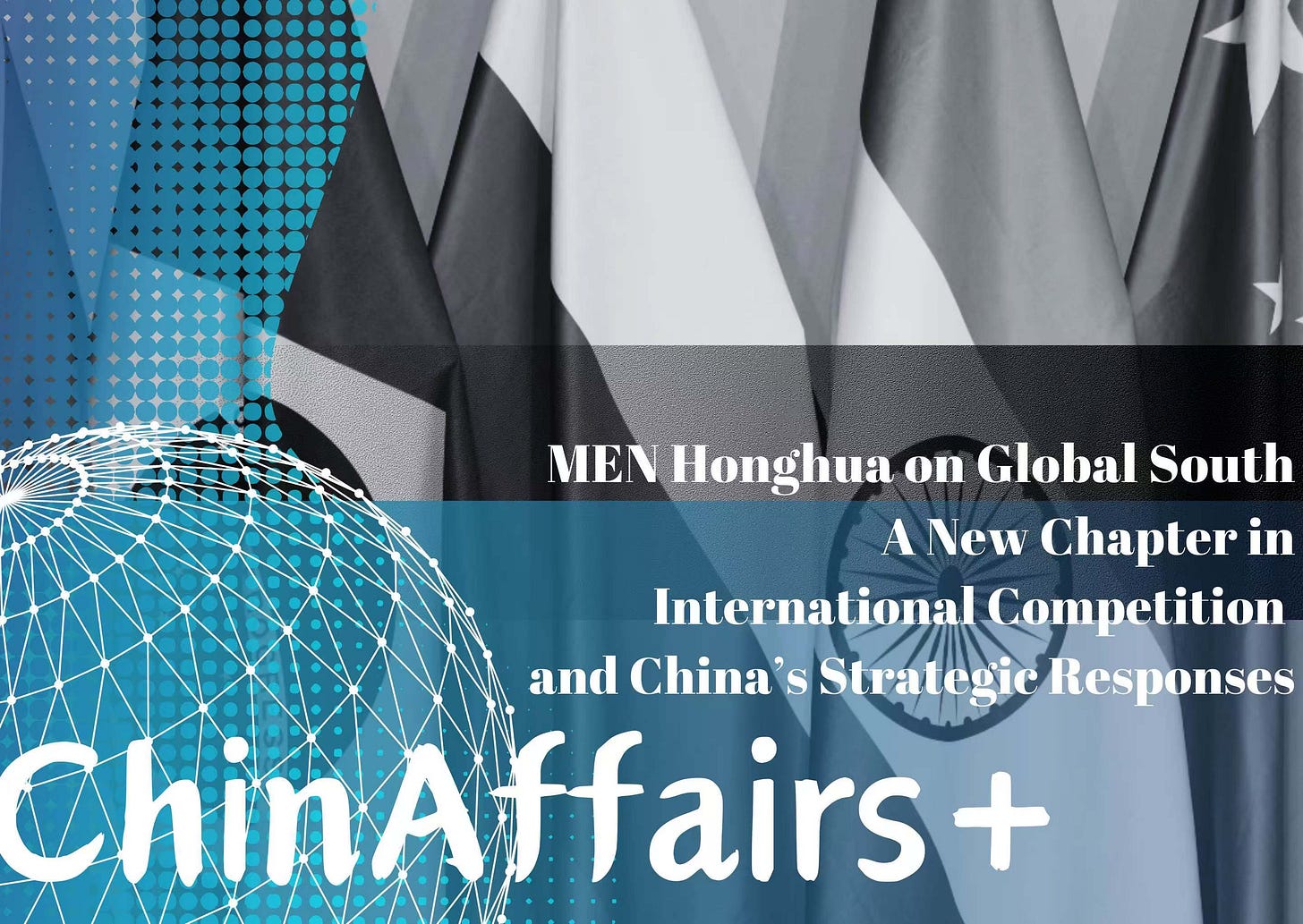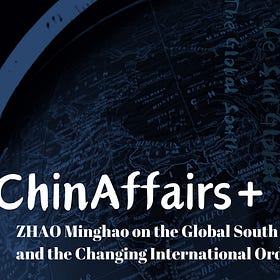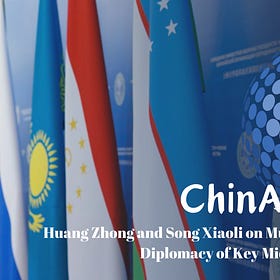MEN Honghua on Global South: The Rise of the Global South, a New Chapter in International Competition and China’s Strategic Responses
China should re-examine its relationship with the Global South, clearly declare that China is a member of the Global South and provides important support for the Global South.
Welcome to the 14th edition of our weekly newsletter! ChinAffairs+ is a weekly newsletter that shares Chinese academic articles focused on topics such as China’s foreign policy, China-U.S. relations, China-European relations, and more. This newsletter was co-founded by me and my research assistant, ZHANG Xueyu. I am SUN Chenghao, a fellow with the Center for International Security and Strategy (CISS) at Tsinghua University, and currently a visiting scholar at the Paul Tsai China Center of Yale Law School in the United States.
Through carefully selected Chinese academic articles, we aim to provide you with key insights into the issues that China's academic and strategic communities are focused on. We will highlight why each article matters and the most important takeaways. Questions or criticisms may be addressed to sunchenghao@tsinghua.edu.cn
Today, we have selected an article written by MEN Honghua, which focuses on the impact of the rise of the Global South on international competition and China's strategy.

Summary
A significant amount of global attention has been drawn to the Global South. This paper analyzes the meaning of the “Global South”, explores its rise and strategic effects, and points out that the Global South has strong economic strength and global influence and the influence of its political stance can not be ignored. The rise of the Global South has brought about new trends in the great power competition: the Global South participates in the global competition with an independent attitude and a stance of no-alliance and not taking sides; the United States and the West actively compete for a say over and cooperation with the Global South, with strong anti-Russian and anti-Chinese sentiments; and Russia seeks to have an edge in the Global South and promote the adjustment of its strategic focus.
In view of this, China should re-examine its relationship with the Global South, clearly declare that China is a member of the Global South and provides important support for the Global South, actively respond to the malicious smears and irrational divisions from the United States and the West, deepen its understanding of the Global South, think about pathways to strengthen cooperation with the Global South from a strategic perspective, and adopt the idea of the Global South as the strategic pillar of China’s diplomacy to carry out top-level design and strategic management.
Why It Matters
On the morning of October 24, at the BRICS 2024 Leaders’ Dialogue, President Xi Jinping reaffirmed China’s commitment to the Global South, emphasizing that no matter how the international situation evolves, China remains steadfast in supporting these nations. He called for uniting the strength of the Global South and welcomed more countries to join the BRICS cause. This statement underscores China’s approach to engaging with the Global South, rooted in mutual respect and win-win cooperation.
This article examines the relationship between China and the Global South from China's perspective, addressing Western skepticism about China's intentions. It analyzes the foundations of China’s foreign policy, highlighting its mutually beneficial ties with these nations. Furthermore, it outlines China’s strategic positioning and actions in fostering partnerships with the Global South across various dimensions.
Drawing on insights from Professor Men Honghua, this article encapsulates his comprehensive views on China's engagement with Global South countries. By doing so, it provides a nuanced understanding of China's role in shaping a cooperative and inclusive international order. This article also reflects the mainstream perspective of the Chinese academic community on the Global South and China's relationship with it.
Key Points
The political influence of the Global South was demonstrated in the response to the Ukraine crisis, which was also an important juncture when the Global South began to promote the evolution of the world pattern. As the Global South gradually rises, China should also deeply recognize the new situation of great power game and optimize its foreign policy.
The Concept of Global South: Discourse on Political Influence and Economic Development
So far, the term “Global South” has remained somewhat vague. After the Cold War, it began to acquire a more nuanced political meaning, referring to the weaker countries within the world system dominated by the United States and Western powers. The author emphasizes that the current concept of the “Global South” is not only a geographical one, but also represents distinctions in economic levels and political characteristics. Economically, the strength of countries in the Global South should not be underestimated, as they hold significant potential for growth. Politically, these countries share a history of opposing hegemony and are marked by greater cultural diversity.
The Rise of the Global South: A Product of Time and Effort
After World War II, the independence movements of Asian, African and Latin American nations brought developing countries to the forefront of international politics. However, due to the debt crises in the Global South and the rise of neoliberalism, the international development agenda for these nations was largely neglected. Following the end of the Cold War, countries such as China, India and Brazil experienced rapid growth, leading to the formation of the BRICS grouping. This marked a resurgence of responsibility for the international development agenda by major developing countries. With the launch of the Belt and Road Initiative, China emerged as a key driver of South-South cooperation.
Active Pursuit of Development and International Cooperation: At the same time, countries in the Global South are actively seeking new opportunities for development. Through platforms like BRICS and the Financial Center for South-South Cooperation, these nations are enhancing international cooperation and asserting their influence on the global stage.
Global South’s Growing Influence in Geopolitics: This is a pivotal moment for the Global South, as these countries are becoming more economically powerful and politically influential. In the wake of the Ukraine crisis, the Global South did not uniformly align with the West but instead voiced their independent positions. Many countries chose not to participate in sanctions against Russia, signaling a shift in global geopolitics and prompting Western nations to reconsider the perspectives of the Global South.
Challenges Facing the Global South: Despite their growing influence, countries in the Global South still face significant challenges. These difficulties stem from geographic constraints, multicultural diversity, and varying levels of development. Additionally, these countries often have asymmetric dependencies on major developed nations, which complicates their path to sustainable development.
The Global South: Facing Internal Pressures and Great Power Competition
The Global South, as an independent political and economic power, is an active participant in the geopolitical landscape.
Independent Attitudes of the Global South: The countries of the Global South exhibit independent stances in global affairs. These nations uphold a clear anti-hegemonic ideology and oppose power politics. For instance, in the case of the Ukraine crisis, many Global South countries view it as a European issue rather than a global one. At the same time, these countries recognize their responsibilities and actively engage in promoting global development governance.
Internal Contradictions and Cooperation Challenges: There are internal contradictions within the Global South. Leading countries such as China, India, Brazil and Indonesia face challenges in cooperation. As key players, the dynamics between these nations are of significant interest. For example, India is currently positioning itself as a leader of the Global South, framing itself as a West-South Power and seeking benefits from both the Global South and the Global North.
External Competition for Influence: External actors, particularly the United States and other Western countries, are competing for influence within the Global South. Recognizing its significance, some Western nations are working to unite Global South countries against Russia and China. While increasing their involvement in Global South affairs, they also offer alternatives to these nations, attempting to shape a collective that excludes China.
Russia’s Efforts to Gain Support from the Global South: In the context of the Russia-Ukraine conflict, Russia is striving to gain the understanding and support of the Global South. Countries in the South, which have not aligned with the West, have shown varying degrees of support for Russia. This makes Global South nations highly attractive to both the United States and Russia, with Russia seeking to expand trade and influence through these countries.
The Rise of the Global South and China’s Diplomatic Strategy Response
China is committed to helping countries in the Global South achieve and maintain their independence in all aspects, and in return, these nations have influenced the direction of China’s diplomacy. Managing relations with developing countries has always been a strategic priority for Chinese leaders, with expanding South-South cooperation now central to China’s diplomatic approach. By strengthening the influence of mechanisms such as BRICS and the Shanghai Cooperation Organization, China aims to protect the interests of developing countries. Furthermore, the rise of the Global South has shaped the evolution of China’s diplomatic strategy, as it provides a framework for deepening China’s understanding of foreign policy and optimizing its international relations.
Strategic Commitment to Developing Countries: The position of developing countries has been clearly defined within China’s diplomatic strategy, as it is committed to helping Southern countries maintain and achieve economic independence, while also striving to uphold a fair international trading system. Additionally, China seeks to balance its support for these nations with efforts to promote global equity and stability.
Bilateral Cooperation and South-South Collaboration: China’s efforts have been focused on addressing the specific security and development needs of Southern countries, while also deepening cooperation with the Global South. As a result, innovative models of South-South cooperation have been pioneered, fostering stronger partnerships and mutual growth.
Regional Economic Cooperation and Equal Dialogue: China has also actively promoted economic cooperation with various regions through bilateral forums, such as the Forum on China-Africa Cooperation. This has fostered equal dialogue and consultation between China and developing regions.
Global Engagement for Strengthening the Global South: Active responses have been made by China to the legitimate demands of Southern countries, aiming to strengthen partnership with these states. Furthermore, for China, efforts should be made to continue enhancing communication and cooperation with the Global South, while also increasing resource investment in global development cooperation.
Conclusion
The relationship between China and the Global South is mutually influential, with both sides needing to make concerted efforts. As one of the world's most successful major developing countries and a core member of the Global South, China is eager to share its experience of modernization and developmental pathways with other countries. While the countries of the Global South must continue their independent struggles, China also needs to further refine its diplomatic strategy to better align with the evolving dynamics of these nations. China's stance on Southern countries has remained consistent, as it continues to support their independent development and strives for greater economic and political autonomy. Moving forward, it will be important to explore how China can adapt its foreign policy to foster deeper collaboration with the Global South while promoting mutual growth. Future research should focus on the effectiveness of China’s diplomatic strategies in addressing the diverse needs of Southern countries, as well as the broader implications of this cooperation for global governance and development.
About the Author
MEN Honghua: Dean of the School of Politics and International Relations/China Academy of Strategic Studies, Tongji University, Special Researcher of the Research Center of Socialism Theory with Chinese Characteristics, Tongji University, Special Professor of Changjiang Scholar of the Ministry of Education.
About the Publication
Founded in 1953, Teaching and Research(《教学与研究》) is a monthly journal of comprehensive academic theory supervised by the Ministry of Education of the People’s Republic of China and sponsored by Renmin University of China. It is one of the first journals funded by the National Social Science Foundation.
ZHAO Minghao on National Identity, Global South and the U.S. Competitive Strategy towards China
Welcome to the 12th edition of our weekly newsletter! As Trump gradually selects his cabinet members, I was recently interviewed by The South China Morning Post regarding his picks for China-related positions. I believed that while these people are undoubtedly tough on China, their future actions and statements cannot be entirely predicted based on thei…
HUANG Zhong and SONG Xiaoli on Multi-alignment Diplomacy of Key Middle Countries
Welcome to the 11th edition of our weekly newsletter! In my latest commentary for Global Times, I examine the current state of China-U.S. relations and highlight the need for a more balanced approach in U.S. policy toward China. With recent years dominated by intense competition, it's become clear that strategies rooted in rivalry have not yielded the i…








